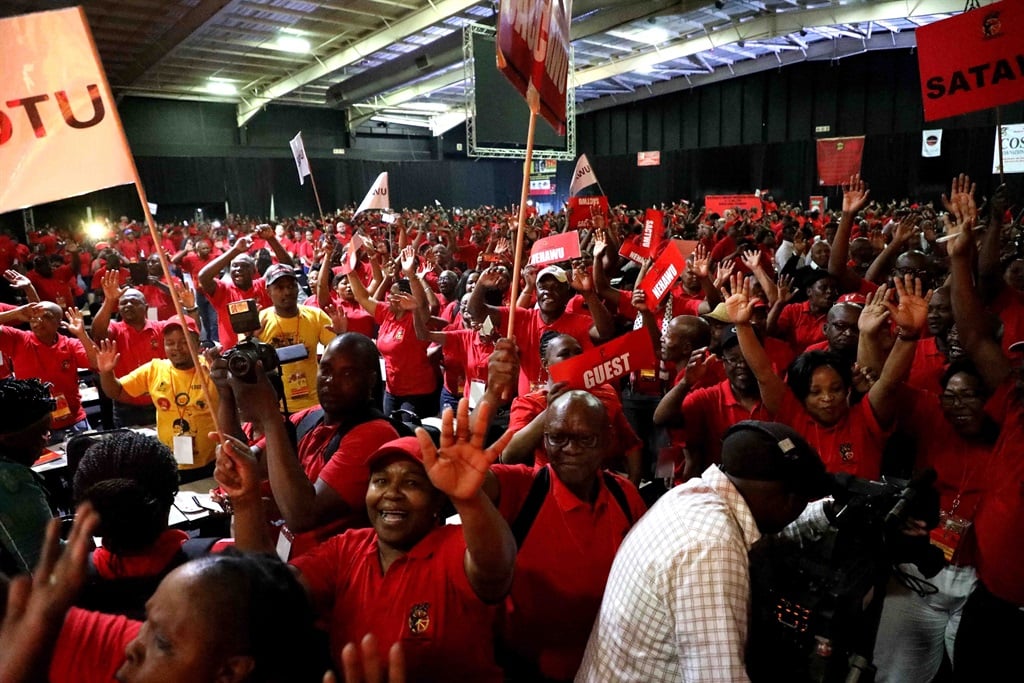
Unions should be more pragmatic and less ideological in their orientation, says the writer. (Thulani Mbele, Sowetan, Gallo Images, file)
Multimedia · User Galleries · News in Pictures Send us your pictures · Send us your stories

Unions should be more pragmatic and less ideological in their orientation, says the writer. (Thulani Mbele, Sowetan, Gallo Images, file)
Multimedia · User Galleries · News in Pictures Send us your pictures · Send us your stories

The old Marx-inspired idea that the only thing workers have is their labour is not applicable in the modern era where workers have the real prospects of making a positive difference by contributing ideas, writes Mpumelelo Mkhabela
As the South African economy bleeds jobs and wages stagnate, trade unions face a dilemma: to strike or not.
Blind pursuit of militant unionism could push them into a striking mode to protest symptoms of a recession.
Strikes could be declared to shine a spotlight on those union leaders normally described as greedy capitalists and the so-called neo-liberal politicians who are bent on trimming the public service.
But, in an economic environment where workers are already under financial strain, forfeiting wages for a strike to make a point could be a moral hazard.
Strikes could add negativity to an economy already beset by load shedding, negative investor sentiment, the ever-present threat of credit rating downgrades and, more recently, the global spread of the deadly coronavirus.
Whatever positives are left of the economy could be destroyed by strikes, scaring already jittery investors and thus harming prospects for recovery.
The other option devoid of drama for unions would be to unleash capacity to engage employers, including government, in ways that brings solutions to the country's economic woes.
This constructive option would require unions to be entrepreneurial in their approach.
The old Marx-inspired idea that the only thing workers have is their labour is not applicable in the modern era where workers have the real prospects of making a positive difference by contributing ideas.
In any event, the idea of exploitation is not applicable in many working environments particularly in government, state-owned companies and some of the high-paying conglomerates.
Low-income workers, those who could be said to suffer exploitation, are cushioned by the government's minimum wage regulations, progressive taxation and provision of free education, among other social provisions.
So, the single biggest challenge the country faces is the scourge of unemployment.
This requires economic growth.
It's no longer enough for unions to exist only for the purposes of improving working conditions of existing workers, including demands for higher wages, and calling for strikes when such demands are not met.
Unions will have to find innovative ways to convince society and employers of the viable way to solve our economic crises, including creating jobs.
They have to be more pragmatic than ideological in orientation.
Striking deals with employers when necessary shouldn’t be seen as ideological suicide.
It certainly can't be suicidal to be entrepreneurial.
Unions must dig deeper from their intellectual and technical resources. Where they are lacking in their technical capacity, they have to source the capacity elsewhere.
It's not helpful for unions to adopt a defeatist approach.
When their members faced the prospects of retrenchment at Eskom, some unions were quick to say workers should not be sacrificial lambs for the crimes of state capture in which they took no part.
They used the same argument at SAA, protesting that the airline's management was to blame for plunging it into the hole of governance failures.
And recently, they made a similar point when the government proposed to slash the public sector wage bill by R160 billion in three years.
Strictly speaking, it is true workers are not to blame.
But since it's in their interests that wrongs should not have been allowed to occur in SOEs, it follows then that workers must pay attention to the way these companies are run.
They must be allocated a quota of board appointments in all SOEs to make them part of decision-making to share responsibility of the direction of these companies.
For that to happen, unions must lobby hard and demonstrate to society the value they will bring to the governance of SOEs.
Hopefully, whatever deal they are hammering out using pension funds to deal with Eskom's debt crisis will include demand for capable labour appointees to sit on the Eskom board.
It should not be seen as co-option.
It works in Germany.
The problems plaguing state-owned companies - corruption, inefficiencies and general poor governance - are mainly to blame for the diminishing public sector resources.
This, in turn, is partly the reason government is slashing public sector spending in both wages and service delivery.
Government continues to spend billions in taxpayers' money bailing out SOEs and settling debt and interests on their behalf.
Ideally, these companies should be paying taxpayers dividends.
Naturally, unions organising in the SOE sectors don't want retrenchment and wage stagnation.
The same applies to the unions organising in the public service.
Surely, there must be a way in which the unions organising in both sectors should have constructive conversations.
Working in silos while the survival of their members is dependent on the mercy of only one authority, the government, is not sustainable.
Adversarial relations between management and unions in the private sector must end.
The economic crisis should bring the parties closer.
It's important but not enough for President Cyril Ramaphosa, business organisations and union leaders to meet under the auspices of the National Economic Development and Labour Council (Nedlac) to talk about job creation in different sectors.
Much more could be achieved if business and labour collaborated at company level.
This is the time when unity of purpose is critical.
- Mkhabela is a regular columnist for News24.
** Want to respond to the columnist? Send your letter or article to voices@news24.com with your name, profile picture, contact details and location. We encourage a diversity of voices and views in our readers' submissions and reserve the right not to publish any and all submissions received.
Disclaimer: News24 encourages freedom of speech and the expression of diverse views. The views of columnists published on News24 are therefore their own and do not necessarily represent the views of News24.